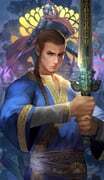What do you think?
Rate this book


640 pages, Hardcover
First published April 7, 2015
“Read a lot of books and try a lot of recipes…When you learn enough about the world, even a blade of grass can be a weapon.”
“A knife is not malicious merely because it is sharp, and a plot is not evil merely because it is effective. All depends on the wielder. The grace of kings is not the same as the morals governing individuals.”
“There’s never going to be an end to suffering if ‘he deserves it’ is all the justification people need for inflicting pain.”
“A lord who knows how to wield men is ten times more fearsome than one who knows only how to wield a sword.”
“A man who can kill several people with a sword is merely a living weapon. A great warrior can kill thousands of men with just his mind.”
“By custom, we wield the sword and wear the armor, but who among you does not know a mother, sister, daughter, friend, who exceeds you in courage and fortitude?
So let us no more think of being compared to women as an insult.”
“Our lives are too brief to worry about the judgment of others, let alone that of history.”
“To know the future is to have no choice… to be words fixed on a page by someone else. We can only do what we think is best, trusting that it will all somehow work out.”
“This is a story very much concerned about all the ways in which every system, however idealistic it may be, tends to have winners and losers and oppressors and the oppressed. The cycle of trying to reach more justice is one that can never end. There is no golden age because we’re always trying to perfect ourselves and yearning towards a future that’s better.”—Ken Liu on The Grace of Kings


'Hi Mr. Liu, I'm reading your book The Grace of Kings but I don't think you deserve full credit for the creation of this story---I mean, let's face it, at least 80% (if not 90%) of this story and its characters areripofflifted from the events in Chinese history and actually existed historical figures from ancient China.'
"Treason was a taint in the blood, and a traitor's sin was borne by the whole family.This belief resulted in a policy of punishing the family of those who are punished for treason. For the old Emperor this resulted in widespread resentment and resistance. But it also reflects the prevailing cultural view that there was an intrinsic quality to an individual's blood. The nobles were inherently better and it was right that they ruled. Liu does an very good job translating this cultural ideas into real world impacts and character motivations.
"The world was so imperfect, and great men were always misunderstood by their own age"Even worse, power warps the very morality that a person holds dear.
"The grace of kings is not the same as the morals governing individuals."Fights started with the best of intentions devolve into naked power grabs as the spirit is brought to heel by vainglorious power. Once again: autocracies are a terrible form of government.
"I have seen the poor suffer when nobles seek the purity of ideas. I have seen the powerless die when princes believe in the nostalgia of their dreams. I have seen the common people torn from peace and thrown into war when kings yearn to test the clarity of their vision."That being said, the fast pace and story style did not lend itself to very much character development. Even the two main characters didn't so much develop as see their underlying qualities in the early part of the book grow in intensity by the end. I felt like most of the characters could be described with a few qualities and lacked depth. They were mostly there to fulfill some story telling device instead of being flesh and blood creations. Too often I was told about the qualities of a character instead of discovering them through the action in the book.
~~~
"... The crowd erupted in applause, and by acclamation, Kuni Garu became the Duke of Zudi. A few pointed out that titles of nobility couldn't be handed out in such a democratic fashion, but these killjoys were ignored."
~~~
"What is fate but coincidences in retrospect?"
~~~
"Emperor, king, general, duke. These are just labels. Climb up the family tree of any of them high enough and you'll find a commoner who dared to take a chance."
She did like Mata, liked his awkward, stiff demeanor; his sincere, unadorned speech; his open face that could not hide how he felt. She even saw his faults in a forgiving light: his hot temper, his fragile pride, his overweening sense of honor.Now, read that and tell me true - does any of that actually sound attractive? Awkward and stiff and a hot temper he can't hide? What a catch!